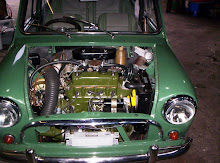The level of the electrolyte in the cells of the battery should not be allowed to fall below the tops of the separators or the separator guard. At least at 1,000-mile intervals—or more frequently in hot weather—a check should be made and distilled water should be added until this level is reached in each cell.
Never use tapwater or rainwater, which usually contain impurities that will shorten the life of the battery. The water that condenses in the drip tray of a refrigerator when the freezing coils are defrosted, however, can be used; but not water obtained by melting ice cubes!
Never use a naked flame when inspecting the level of the fluid in the cells, as an explosive mixture of hydrogen and oxygen may be present.
It is best to add water just before the cells are to be charged. In cold weather this will allow the acid and water to mix thoroughly and thus avoid any risk of the water freezing and damaging the plates and battery case. It should not be necessary to add acid unless some of the electrolyte has been spilt, in which case a B.L.M.C. dealer should be consulted. If acid is added in order to raise the specific gravity of the. electrolyte, the plates may be damaged.
The need for excessive topping-up of all the cells is usually an indication of an unduly high generator charging rate. If one cell regularly requires more water than the others, a leak in that cell must be suspected. Even a slow leak may, in time, completely drain the acid from a cell.
Another under-bonnet view
1. Brake fluid reservoir
2. Clutch fluid reservoir
3. Carburettor idling-mixture adjustment
4. Cable abutment plate
5 Heater water-control tap
6. Engine torque rod
7. Clutch-cylinder bleed nipple
Remember that the electrolyte is a solution of sulphuric acid in water and is very corrosive. Never place the vent plugs on the bodywork. If any electrolyte is spilled, wipe it away immediately with a clean wet cloth and then dry the part thoroughly; household ammonia, if available, will neutralize the acid.



0 comments:
Post a Comment